大学英语第二册第二单元关于沃尔玛的ppt
- 格式:pptx
- 大小:299.93 KB
- 文档页数:15
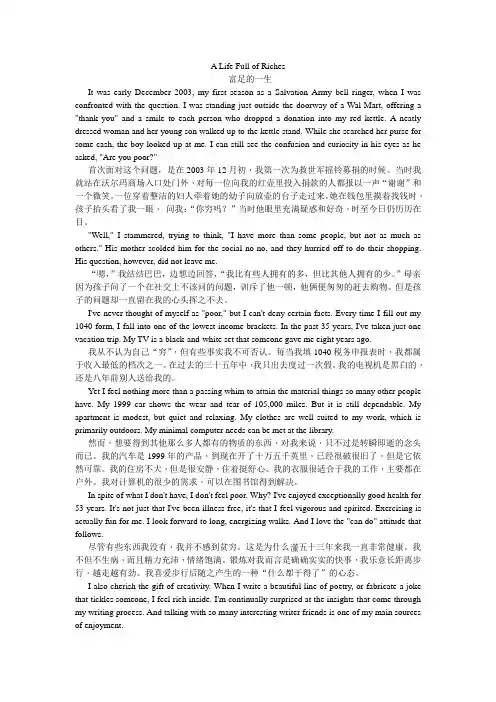
A Life Full of Riches富足的一生It was early December 2003, my first season as a Salvation Army bell ringer, when I was confronted with the question. I was standing just outside the doorway of a Wal-Mart, offering a "thank you" and a smile to each person who dropped a donation into my red kettle. A neatly dressed woman and her young son walked up to the kettle stand. While she searched her purse for some cash, the boy looked up at me. I can still see the confusion and curiosity in his eyes as he asked, "Are you poor?"首次面对这个问题,是在2003年12月初,我第一次为救世军摇铃募捐的时候。
当时我就站在沃尔玛商场入口处门外,对每一位向我的红壶里投入捐款的人都报以一声“谢谢”和一个微笑。
一位穿着整洁的妇人牵着她的幼子向放壶的台子走过来。
她在钱包里摸着找钱时,孩子抬头看了我一眼,问我:“你穷吗?”当时他眼里充满疑惑和好奇,时至今日仍历历在目。
"Well," I stammered, trying to think, "I have more than some people, but not as much as others." His mother scolded him for the social no-no, and they hurried off to do their shopping. His question, however, did not leave me.“嗯,”我结结巴巴,边想边回答,“我比有些人拥有的多,但比其他人拥有的少。
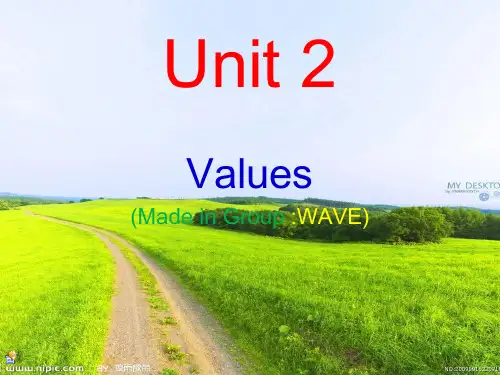

A Life Full of Riches富足的一生It was early December 2003, my first season as a Salvation Army bell ringer, when I was confronted with the question. I was standing just outside the doorway of a Wal-Mart, offering a "thank you" and a smile to each person who dropped a donation into my red kettle. A neatly dressed woman and her young son walked up to the kettle stand. While she searched her purse for some cash, the boy looked up at me. I can still see the confusion and curiosity in his eyes as he asked, "Are you poor?"首次面对这个问题,是在2003年12月初,我第一次为救世军摇铃募捐的时候。
当时我就站在沃尔玛商场入口处门外,对每一位向我的红壶里投入捐款的人都报以一声“谢谢”和一个微笑。
一位穿着整洁的妇人牵着她的幼子向放壶的台子走过来。
她在钱包里摸着找钱时,孩子抬头看了我一眼,问我:“你穷吗?”当时他眼里充满疑惑和好奇,时至今日仍历历在目。
"Well," I stammered, trying to think, "I have more than some people, but not as much as others." His mother scolded him for the social no-no, and they hurried off to do their shopping. His question, however, did not leave me.“嗯,”我结结巴巴,边想边回答,“我比有些人拥有的多,但比其他人拥有的少。

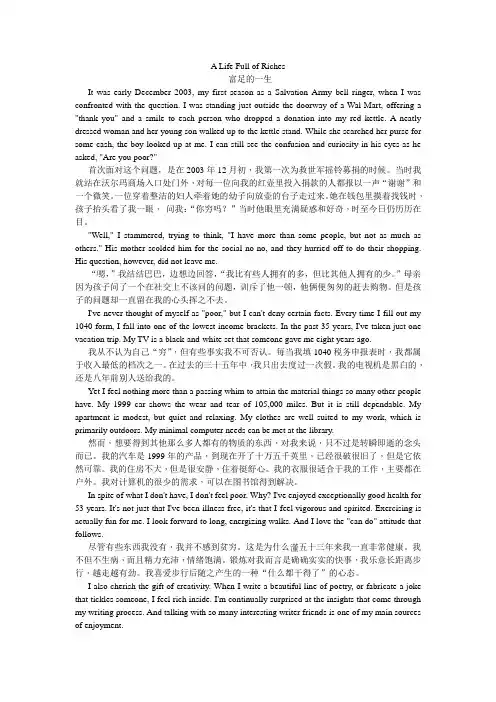
A Life Full of Riches富足的一生It was early December 2003, my first season as a Salvation Army bell ringer, when I was confronted with the question. I was standing just outside the doorway of a Wal-Mart, offering a "thank you" and a smile to each person who dropped a donation into my red kettle. A neatly dressed woman and her young son walked up to the kettle stand. While she searched her purse for some cash, the boy looked up at me. I can still see the confusion and curiosity in his eyes as he asked, "Are you poor?"首次面对这个问题,是在2003年12月初,我第一次为救世军摇铃募捐的时候。
当时我就站在沃尔玛商场入口处门外,对每一位向我的红壶里投入捐款的人都报以一声“谢谢”和一个微笑。
一位穿着整洁的妇人牵着她的幼子向放壶的台子走过来。
她在钱包里摸着找钱时,孩子抬头看了我一眼,问我:“你穷吗?”当时他眼里充满疑惑和好奇,时至今日仍历历在目。
"Well," I stammered, trying to think, "I have more than some people, but not as much as others." His mother scolded him for the social no-no, and they hurried off to do their shopping. His question, however, did not leave me.“嗯,”我结结巴巴,边想边回答,“我比有些人拥有的多,但比其他人拥有的少。
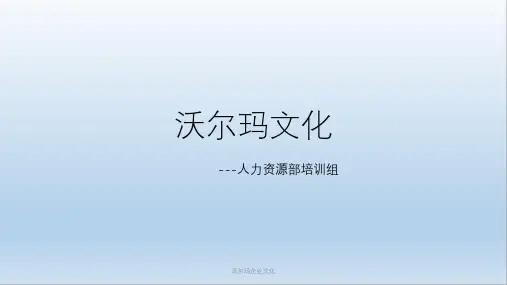
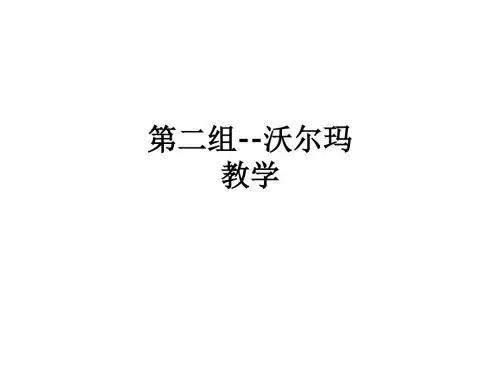
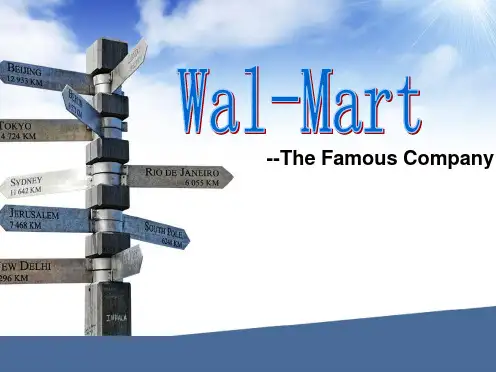
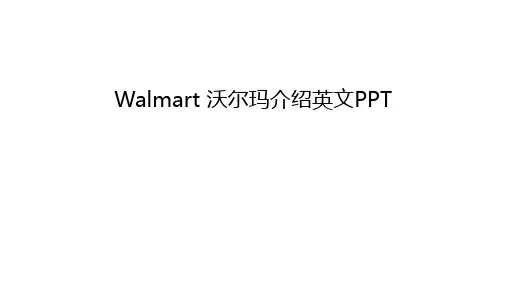
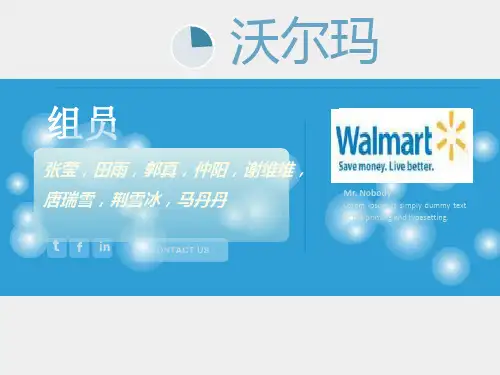
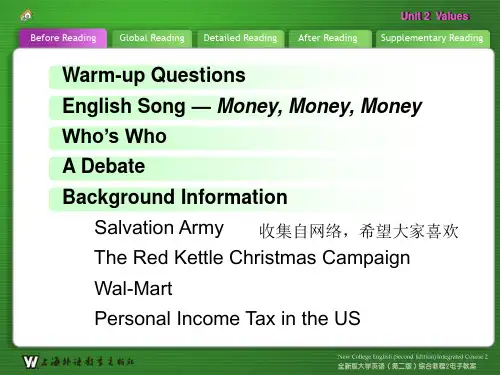
SUMMARYUnit 1.众所周知,东方人和西方人在儿童教育方面存在着很大的差异。
东方人非常重视儿童早期的技能教育,而并不急于促进创造力的发展。
另一方面,西方人更多的强调小孩的创造力,认为技能以后能学会。
事实上,学会自己解决问题的办法与把手教的方法各有其优缺点。
因此,我们应从两者之间寻求一种更好的教育方式,以达到一种平衡。
It is known to all that there is a great difference in child education between Westerners and Easterners. Easterners give greater priority to developing skills at an early age, rather than promoting creativity. On the other hand, Westerners pay more attention to children’s creativity, believing that skills can be picked up later. In fact, both learning to solve problems by themselves and teaching by holding the hand have their advantages and disadvantages. Therefore,we should find a superior way to approach education, striking a better balance between the two extremes.Unit 2.萨姆沃尔顿在本顿维尔小镇从一个专卖廉价商品的小店起家,逐渐发展成为价值60亿美金资产的廉价连锁店——沃尔玛公司。
人人都说他为人友善,性情开朗,是个好邻居;他尽力与人们融洽相处,从不炫耀,也从不生气凌人。